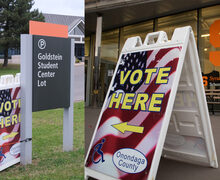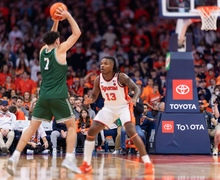University Senate : Committee on Athletic Policy presents report
A report from the Committee on Athletic Policy fueled most of Wednesday afternoon’s University Senate session.
During the 40-minute session, faculty posed questions about student-athlete academic performance and the financial relationship between the athletic department and the Carrier Dome. The committee also discussed a video about athletes having to be campus role models.
USen, which works as Syracuse University’s academic governing body, meets once a month at 4 p.m. in Maxwell Auditorium. The time is a change from last year’s meeting time of 4:15 p.m., and members joked that not everyone got the memo, as dozens of faculty wandered in late.
Martha Hanson, who presented the athletic policy report, spoke of a new video for student athletes about social responsibility on campus. The report describes the film as having commentary by former and current SU football, basketball and lacrosse players.
‘This was one of the most heartening, compelling, poignant videos I’ve ever seen,’ Hanson said. ‘In terms of bringing across the mistakes, or the opportunities that our student athletes have to make mistakes, what they can learn from those mistakes, thinking and contemplating about how to prevent making those mistakes.’
Hanson said she wished the entire Senate could watch the video. University spokesman Kevin Quinn said he would look into it because the video was originally produced exclusively for student athletes.
‘I know there were some student athletes, former student athletes, who really spoke candidly about mistakes they had made,’ he said.
Hanson also reported SU lost two athletic scholarships last year due to three student athletes — Jonny Flynn, Eric Devendorf and Paul Harris — dropping out to pursue professional careers before graduation. Quinn said he anticipates SU’s NCAA Academic Progress Rate will bounce back and the athletic department won’t lose more scholarships.
Robert Van Gulick, a philosophy professor, asked about a line in the report that states, ‘The athletic department’s vision demands that all SU teams should be nationally competitive.’ Van Gulick asked why athletics is expected to be nationally competitive across the board and if that would be an unrealistic goal for academics.
‘The counterpoint from the academic side might be, in general, we don’t feel we can be nationally competitive in all of our academic programs,’ Van Gulick said. ‘We try to provide quality programs, wherever we have a student program, that will benefit the students and allow them to have a good education here. But we can’t be nationally competitive in every academic field.’
Chancellor Nancy Cantor disagreed. She said SU mounts fewer competitive athletic teams than other schools, as a way to focus resources on those teams it does mount. The university considers which sports it can excel in and which ones shouldn’t be started, Cantor said. She then turned to address academic standards.
‘I would assume that everyone at SU — every dean, every chair, every department — wants to strive to focus intellectually on things that we have a chance at being nationally competitive in,’ Cantor said. ‘So the idea is not so much that, writ large, you’re going to mount everything you can mount and get them all up to being excellent. It’s that you’re going to make the right choices about what you have a chance to be excellent in.’
Barbara Kwasnik, chair of the Committee on Curricula, offered her committee’s report for approval. The packet mentions a new environment and society undergraduate minor and a master’s in collaborative design in the College of Visual and Performing Arts.
Kwasnik noted the increasingly interdisciplinary nature of new proposed courses. She also said individual schools and colleges will soon focus on better enforcement of class prerequisites.
Other business included:
• Approval of last month’s USen minutes
• Approval of committee chairs who are not elected USen members
Published on October 13, 2010 at 12:00 pm





